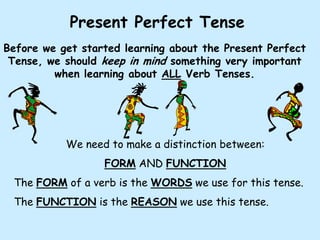The document discusses the present perfect tense. It explains that the form uses the auxiliary verbs "have" or "has" plus the past participle. The function is to describe actions that occurred at an unspecified time before now or actions with relevance in the present. Specifically, the present perfect tense is used to talk about completed past actions without specifying when they occurred, and to form questions using "have/has ever" to ask about experiences. It provides examples to illustrate both the form and functions of the present perfect tense.









